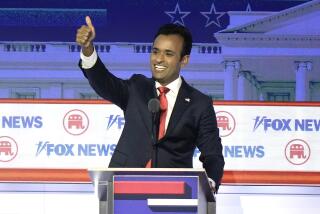For Quayle, Comeback Has Pitfall
- Share via
PITTSBURGH, Pa. — Both men vaulted at an early age from the Senate to the center stage of national politics as vice presidents. Both nearly had their careers wrecked by revelations about their past. Both were harshly treated by the press.
So it was with Richard Nixon. So it was with Dan Quayle.
Now, as Quayle prepares for a possible White House run by speaking to Republican audiences--such as one in Pittsburgh recently--his performance will test whether, like Nixon, he can establish a new identity for himself and take command of his party. “The country is coming our way, folks,” Quayle said in Pittsburgh, seeking--as Nixon did--to link himself to the conservative ardor of the party’s rank-and-file.
But the former Indiana senator confronts an image problem even more formidable than the “Tricky Dick” label that Nixon had to overcome. For Quayle was the target of the most devastating weapon in politics--ridicule.
Political analysts agree that finding a way to live down all those jokes made at his expense is the key to his chances of following Nixon’s footsteps all the way to the Oval Office.
Mindful of the problem, Quayle tries to laugh off his reputation as a laughingstock. Among the things he does not miss from his vice presidential days, Quayle conceded in his remarks here, are talk-show hosts Jay Leno and David Letterman, who reveled in exploiting his miscues.
“When they used to come on the air, I used to turn those folks off,” Quayle said. “But you know what? They’re much funnier these days.”
Quayle’s problem, however, will not be solved easily, as reaction from members of his weekend audience indicate.
“I admire him very much,” said Ben Sober, a retired lab technician. “But I just don’t see him making a comeback. People just remember he was pilloried by the press.”
Despite such speculation, the nature of the campaign for the GOP presidential nomination makes it impossible to dismiss Quayle’s prospects out of hand.
With the Republicans lacking a clear front-runner for the first time in recent memory, a large field of prospects looms. Among them are such 1996 also-rans as vice presidential nominee Jack Kemp, former Tennessee Gov. Lamar Alexander and publishing magnate Steve Forbes, as well as such new possibilities as Texas Gov. George W. Bush, Arizona Sen. John McCain and Ohio Rep. John R. Kasich.
In this company, Quayle has important assets, beginning with name recognition higher than any of his potential rivals, with the exception of Kemp. And in any contest with Kemp, GOP consultant David Keene said, “Quayle can always say: ‘I did better against Al Gore than Kemp did.’ ” That would contrast Quayle’s feisty debate performance during the 1992 campaign with Kemp’s passive showing in 1996 against their mutual Democratic rival in the vice presidential races.
In addition, by moving his home from Indiana to Arizona after the 1996 election, Quayle has positioned himself for a home-field advantage in his new state’s early primary. The move also locates him near the vast financial and political resources of California.
*
Still, as Quayle himself acknowledges, the success of his comeback depends on linking himself to a compelling idea, as Nixon did to the crusade against communism. Quayle believes that the battle on behalf of family values can accomplish the same purpose for him.
Americans “are doing OK when it comes to creating wealth,” Quayle told his Pittsburgh audience. “But look at every single moral indicator and it’s probably going in the wrong direction.”
By defining family values in a broad sense--to include such concerns as education--Quayle hopes to extend the appeal of this issue, as well as add a populist spin to it.
Potentially more controversial is another Quayle idea--letting wage-earners at age 45 or younger opt out at least partly from the Social Security system by reducing their contributions to the federal program and investing the money in their own retirement plans.
“What we really want to do is give younger people some flexibility,” Quayle said, even as he acknowledged that “it’s politically risky” to push for fundamental changes in Social Security.
But as Nixon, the master of political realism, might have pointed out, given Quayle’s circumstances, he cannot afford not to take risks.
More to Read
Get the L.A. Times Politics newsletter
Deeply reported insights into legislation, politics and policy from Sacramento, Washington and beyond. In your inbox twice per week.
You may occasionally receive promotional content from the Los Angeles Times.










